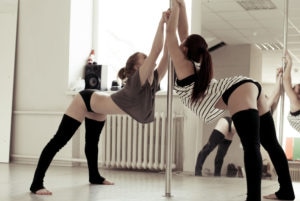Students Doubt Their Skills
Many trainers are familiar with a situation when their student does not believe in himself. He/She does not believe that his/her technique will work, that he/she can do the splits, that he/she is prepared for a competition and that some day he/she may become a pro in pole dancing classes. The lack of self-confidence may vary. The important factor is not to let the lack of confidence grow.
It is essential to realise what causes the student to doubt his/her abilities. Try to cautiously discuss this with the student.

Does his insufficient confidence stem from a previous experience or from his comparing himself against other students? Is he encumbered by stereotypes in his mind or does he merely lack a positive experience in such matters? Are there real grounds for this distrust in himself or is it more of a paranoia?
Choose the operating tactics and the system of dealing with the student depending on the answers to the following questions.
If person is hampered by stereotypes (for instance, 30 years is too old for doing a split) and there were no positive experience or good examples to follow) you will have to rely on whatever gift of conviction you have. You’ll make use of verbal motivation and juggling with your own and other people’s examples.
If the student had a negative experience in the past (be it even in another sport or type of dance) you’ll have to construct your training procedure so that he would not lose confidence about his future success. To achieve this it’s enough not to throw the student into the thick of battle and not to take up the excessively difficult tricks. The right policy is to alternate the complex elements with simple ones, and to praise and encourage the pupil even for his minimum progress.

Here are a few more things that will help overcome the lack of confidence:
– measure the progress, i.e. weekly and monthly photo/video recording. Compare results.
– keep the diary of success. Record in a notepad each new victory, no matter how small. Today it may be just climbing up to the middle of the pylon, but a week later it may be reaching the ceiling. Then the pupil will have no chance to say “nothing works.”
– do not register the failures (avoid “you fell five times”, opt for “you did it two times”).
– stop comparing the students;
– show the achievements using your own or somebody else’s example.
Try not to step over the trainer’s support, do not turn the training into talks about psychology or admonition.



